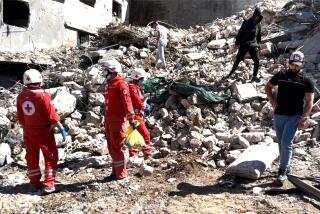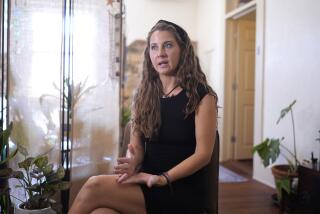War zone midwives deliver
- Share via
Baghdad — THE woman was nine months pregnant and in shock: She had just watched her father and uncle die at a bomber’s hands. The baby was coming, but her family was afraid to take her to a hospital, where they might be kidnapped or killed by roving militias.
And so, like many Iraqis these days, they turned to an unlicensed midwife.
The baby girl was born in Samira Majeed’s makeshift delivery room, a chilly, windowless apartment foyer with a sheet of battered linoleum spread across the floor like a rug. Although the infant appeared healthy, she didn’t cry -- a sign of trouble, Majeed told the family.
Majeed checked the baby’s mouth. Sure enough, she wasn’t breathing. So the midwife started to shake her, gently at first, then harder.
Desperate, Majeed resorted to a lifesaving technique she learned from her mother, a midwife herself.
“I breathed in her mouth to give her life,” Majeed said, and then she pricked the newborn’s ear to revive her.
Within moments, the baby began to cry. She would live.
As gunmen increasingly target hospitals and clinics in Iraq’s deepening civil war, expectant mothers rely on the country’s 2,000 midwives, or qabilas, and 3,000 lower-skilled rural “birth attendants” -- all of whom the state no longer licenses or trains, in an effort to steer women to government clinics.
Last week, a Sunni Arab woman took her 2-month-old baby to a doctor to get a birth certificate. They were kidnapped and killed.
Majeed, who says she has delivered more than 300 babies in the last decade, was once licensed and even made house calls. But she has stopped leaving her Karada neighborhood, afraid to trust families or the streets, where militias set up checkpoints.
A Sunni Arab, she treats patients of all sects.
Women come knocking at her small door, nearly hidden below a concrete staircase in her run-down apartment building. She greets them, a short woman with a round face and wide eyes, wearing velour sweatpants and colored scarves.
Majeed leads patients into her delivery room, where the family sink and freezer sit beside a cabinet that holds painkillers, syringes, antiseptic, a stethoscope and other medical supplies.
IF the electricity isn’t out, as it is a few times a day, Majeed’s patients can gaze around the delivery room at her good-luck charms: a gold plaque printed with a verse from the Koran about God’s life-sustaining power; a picture of the Shiite Muslim child martyr Abdullah. In the far corner, in the shadows, hangs a black-and-white photograph of a baby with a caption in English: “To be or not to be.”
More babies are dying in Iraq today than when U.S. forces arrived in March 2003, and medical experts say poor health policy is as much to blame as the civil war.
Iraq’s Health Ministry stopped licensing midwives and training birth assistants in 2003, even though they deliver half the country’s babies, up from one-quarter in 2000, according to figures from the ministry and the United Nations Development Program. Studies by the UNDP indicate that better training for midwives could save the lives of Iraqi mothers and babies.
Iraqi health officials said they would rather see women go to the country’s 1,848 government-run clinics.
“We stopped training and issuing licenses because our ultimate objective is to encourage mothers to seek professional help from our health centers in order to decrease any complications that may arise and act upon them in a thorough manner,” said Dr. Ahlam Kadhem, the ministry’s chief of maternal and child health.
But Kadhem acknowledges that the clinics’ reach is limited, in part because of the increasing violence. The facilities serve only 30% of residents in 15 of the country’s 18 provinces. The three provinces in the Kurdish north have their own, autonomous clinics.
U.S. troops and charities have helped build hospitals, but security concerns drive away staff and patients and have prevented the construction of 120 new clinics, Kadhem said.
Costs are also a concern.
Zainab Nima, 40, is nine months pregnant with her fourth child. The tall Shiite woman, whose head scarf frames large brown eyes, intends to give birth at home in the southern city of Kifil. She scoffs at hospitals, calling them “one-star hotels.”
“Doctors are now just like tradesmen, uncaring about the pains and the needs of the patients,” she said. “Many families are unable to afford the costs.”
Aliaa Khamil, 33, of the nearby city of Hillah is seven months pregnant with her first child and also plans to deliver at home, although she’s heard the government warnings that she should go to a hospital.
DURING a recent visit to a clinic, she said she was worried she would be mistreated at the local hospital, which is short on supplies. She has already forgone ultrasounds and supplements her doctor recommended because they cost about $18, too expensive for the homemaker and her husband, a teacher who earns $110 a month.
Dr. Haifa Qadir, who treats women in the northern city of Kirkuk, says many women visit midwives because hospital deliveries are too expensive. Government hospitals charge $35, private hospitals $350, she said. Midwives generally charge $18 to $70, a sliding scale that Majeed said includes charity deliveries for families that can’t pay.
U.S. reconstruction officials promised to cut Iraq’s infant mortality rate in half by 2005. Instead, it has increased from 125 deaths per 1,000 births in 2002 to 130 per 1,000 in 2006, Health Ministry figures show. In 1989, the rate was 40 per 1,000, according to the World Health Organization.
UNICEF this month plans to release the results of a sweeping survey that will show infant mortality increasing steadily since 1990, after the Persian Gulf War in 1991 and the economic sanctions that followed -- and more quickly in recent years, said Claire Hajaj, a spokeswoman for UNICEF’s Iraq Support Center in Amman, Jordan.
“We’re seeing a very rapid downturn,” she said. “For sure, things are getting worse. More babies are dying.”
More Iraqi mothers are dying too, she said. UNICEF figures show the number of women who die during pregnancy or childbirth has increased 65% since 1989, when it was 117 in 100,000. Untrained midwives may be part of the breakdown in care, she said.
“When something goes wrong, you need a skilled person there to help you, a place to go for more help and a community that’s safe to get you there,” Hajaj said.
Majeed and other midwives say they are seeing more complications -- pregnancies that last longer than expected, high blood pressure and birth defects.
Majeed would rather be licensed. Although she and other midwives first trained with their mothers and still consult one another, she says that’s no replacement for the annual training and blood and vision tests the hospitals used to provide.
“The nurse is the first one to hold the newborn baby,” she said, referring to the midwife at delivery. “Whatever is wrong with the nurse could be passed to the newborn.”
Would-be mothers know the risks of consulting an unlicensed midwife, Majeed said, but it’s just one in a long list of concerns.
Many of the women she sees are conflicted about giving birth during a civil war, worried they won’t be able to protect or support a newborn. For these women, Majeed serves as a quasi-doctor and counselor, offering family planning and birth-control tips.
“Under such circumstances, I recommend that parents don’t have children,” Majeed said. “The atmosphere is polluted and there is not much care for women and their babies now.”
Mothers in Iraq must be prepared to fight for their babies’ lives, she said.
She knows. A year ago, she almost lost one of her own.
The pregnancy was unplanned. At 40, Majeed already had two teenage sons. But she and her husband, a car dealer, wanted a girl. Maybe this was the one, she thought. She made sure to check her blood pressure regularly, ate healthy foods and saw a doctor for vaccines.
Majeed was nine months pregnant when the attackers struck.
That January morning, she and her husband woke to the sound of their windows shattering. A car bomb had exploded outside. Majeed was fleeing the building when her husband pulled her back into her makeshift delivery room just as a second bomb exploded, saving her life.
As they watched from the doorway, the apartment caved around them in a fog of debris. Majeed could hear wounded neighbors screaming for her to come treat them. Three of her neighbors died. Two she had been treating miscarried.
Majeed started hemorrhaging soon after the explosions. Her husband rushed her to the hospital; she had planned to deliver at home with her mother, but doctors recommended a caesarean. Majeed agreed.
It was a boy. He weighed less than 3 pounds and struggled to breathe with undersized lungs.
Majeed named him after the prophet Muhammad, and nicknamed him Hamoudi.
When she woke the next morning, doctors told her that Hamoudi was weak, needed an incubator and oxygen, and probably wouldn’t live.
But the midwife was stubborn. She and her husband searched local hospitals until they found one with an incubator and oxygen.
When it proved too expensive -- about $10 a night for the incubator alone -- Majeed retreated with Hamoudi to her parents’ house and filled his room with electric heaters.
Nearly a year later, Hamoudi is sitting, crawling and standing in Majeed’s refurbished apartment, squealing with delight at strangers, a living, breathing symbol of hope for pregnant women who come to call.
Majeed’s husband talks of moving to Jordan. But she refuses to abandon her patients and her calling.
“I don’t think that I can leave my job, because it’s the family business and I love doing it,” she said.
“It makes me feel good when I can lessen people’s pain. This craft is bringing me closer to God and to people.”
molly.hennessy-fiske@latimes.com
*
Times staff writers Zeena Kareem and Said Rifai and correspondents in Hillah and Kirkuk contributed to this report.
More to Read
Sign up for Essential California
The most important California stories and recommendations in your inbox every morning.
You may occasionally receive promotional content from the Los Angeles Times.











